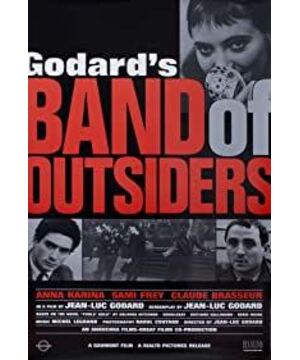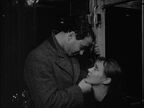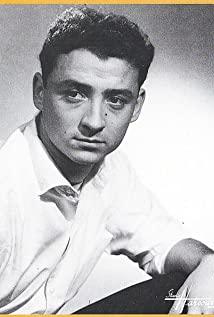Author: Pauline Kael (The New Republic)
Translator: csh
The translation was first published in "Iris"
Jean-Luc Godard intends to provide the public with what they want. His next film (Translator's Note: This article was published in 1966) will be related to a girl and a gun-"A story that is bound to go viral. Many people will buy tickets." After that, just like the male protagonist in Henry James's "Next Time," he will make a work of art, and the movie can sell far fewer tickets than before. As for this simple commercial movie about a robbery, it's called "Outlaws".
The two male protagonists in "Outside the Law" initially played roles in criminal and violent movies. Later, they began to show their lives. Their girl wanted to be accepted by them. She told them that she had money in her villa. Then, we observed, worried, and confused, because these three people "played" the robbery, as if it were what happened in a movie (or a fairy tale). Crime is not suitable for these daydreamers, nor for their environment: to some extent, we expect to be told that all this is a joke, and they cannot truly commit armed robbery. "Outside the Law" is like a fantasy about a gangster movie, because the students sitting in a cafe may suddenly come up with such an idea, or even plan a robbery-it will take advantage of the gangster movie. (Loyalty and bravery) are mixed with naive, immoral, imbalance and other characteristics.
This is like a French poet who has written an ordinary and mediocre American crime novel. We will discover the true identity of this author in the romance and beauty between the lines. In other words, Godard infused his own imagination in this film and reshaped the image of gangsters and mistresses in his "Godard Universe"-he saw them as people in Paris cafes, Mix them with Rimbaud, Kafka, and "Alice in Wonderland". Is this stupid? But we know that the movies that stimulate our imagination and are embedded in our lives are actually so alienated from our lives. As children, we, and even older ones, will romanticize those cheap stereotyped movie images. Perhaps other more imaginative artistic images will impress us, but we will naturally give these stereotypes the characteristics of these images in the process of romanticizing-isn't it? All the experiences we acquire in art and pop art are stronger than our daily experience, but wouldn't these two different experiences merge in our imagined world? And film is such an inclusive and eclectic art. It is an ideal medium that can combine our experience and fantasy of daily life. It can integrate all art and all our chaotic memories. . Some people will inject some of their own history and art experience into those clichés-just like Howard Hawkes and Richard Rosen in "Scarface" reconstructed the Capone family Like the story, they make these criminals look like "the Borgia family who moved to Chicago."
The sense of alienation created by Godard's imagination evokes a tender and desperate mood. It brings us closer to these movie-based heroes and the innocent girl, rather than accepting ordinary people. The kind of naturalistic character in the movie. They remind us of other lives in the movie, and those images flicker for us on the screen. The fast-paced and changing emotions emphasize the sense of ephemeral and impermanence. The fragile existence of these characters makes us feel sad, depressed, nostalgic, and also makes us more tender.
This kind of nostalgia has permeated "Outside the Law". The root of this emotion may come from Godard's feeling that the possibility of film is constantly passing away. He once said, "When you can make a movie, you will no longer be able to make the kind of movie that makes you want to make a movie." We can probably speculate that this is because of the expensive blockbuster film production in the United States. The model is almost impossible to exist in France. But more importantly, if there is a young movie lover, when he grows up, if he has enough talent, then he will find that the expensive blockbusters that are being produced do not need to be created. Maybe a good movie has never been created: when you were young, you felt that those extravagant and wasteful movies looked so magical, as if you had entered the world of "The Thousand and One Nights". But when you get old, you find that they have become so ugly, so suffocating, and you find that they are such a scam. The vulgar "One Thousand and One Nights" in American gangster movies is exactly Godard's childhood dreams, which also constitutes his style-it is a poem about the city, praising the speed of life, A soul with no regrets, a fleeting life and death, a life attitude that does not require self-protection or interpretation. But in his works, the meaning of "gangster movies" must be rewritten.
An artist may feel regret, because he can no longer experience the artistic enjoyment of childhood and adolescence, which is a kind of bliss that makes him an artist. However, Godard is not as naive as the Hollywood product makers. He doesn't think he can recreate the kind of movies he has enjoyed since childhood. However, his love for that kind of movie has shaped his taste, and he puts this nostalgia for old movies in his movies, making them an element of initiative. Like many artists, he did not deny that he was far away from his past. Maybe he has made sure that he doesn't need to deny it, or maybe he hasn't "grown up" completely. He re-quoted it, gave it a different texture, and reshaped it into an experience that can be shared, a sense of humor that can be shared. He is playing with his own beliefs and doubts. This kind of playfulness may make his work seem irrelevant and more relaxed than before: as if the artist himself opposes any deep meaning and is just playing in the medium. Critics often complain that they cannot take Godard seriously. But if you think about what they take seriously, you will find that this is not a serious objection.
Because Godard's movies will not make us forget that we are watching a movie, it is easy for us to think that he is just joking. However, his reminder to us has an opposite purpose. His film tells us that his goal is not just to achieve simple realism. The lives of his characters will continue to change because of their fantasy. But if I just want to fantasize purely, then he doesn't seem to be what I want: what he focuses on is the poem in reality, and the reality in the poem. I have shown that his work is either an annoying narcissism or a lyrical poem-it depends on your mood, depends on what coordinate system you place his work on, and depends on whether you Godard's words must be used to measure his works. The narrator of "Outside the Law" stated: "Franz doesn't know whether the world is turning into a dream or the dream is turning into a world." We might think that this declaration is too deliberately carried. With a fabulous texture, it is too easy to remind us of the narrators in "Orpheus" (1950) and "Horrible Children" (1950); but we can also simply be immersed in its beauty . I think those who are most sensitive to Godard's methods can do both of the above. When we read Cervantes's "Don Quixote", we will see the same thing: Don Quixote is confused by the story of the ranger knight, and he goes out of the house to fight the imaginary villain. We can call him the ancestor of the heroes of Godard, who have dreams in American movies and witnessed the lives of police and gangsters. Perhaps there is a key difference between Cervantes’ simulated romance and Godard’s simulated melodrama-Godard may share some movie character fantasy (for example, in "Alpha City") .
He has a cold, quick, and calm style, but this style has a romantic meaning to him (the same is true for all "non-sensual" fans, who love American gangster movies so much). Between the cold style and the warm meaning, there is a tension. This tension is very modern and exciting in his works. He adopted a random approach, omitting some mechanized scenes that he was not interested in. In this way, the whole movie is the climax point, and it's all some wonderful "little things." Godard's films have his own style, and he is indifferent to the fate of the characters-this quality comes from American movies, but it has been refined in French philosophy and life after the war, and has become a kind of intellectual life. manner. It can be said that Godard's style is precisely the ideal of an American youth. As determined and cold as the criminals in a movie, but not as stupid and rude as the gangsters-they want to be clever, privileged young people with a cold and elegant demeanor.
When we appreciate art, starting from our own experience, it is always quite respectable, sometimes even fashionable: to associate a circus scene with Picasso, or to use Enso’s paintings to describe a Broadway deli People in. However, until recently, people seemed to feel that associating their feelings with the movie itself has become a shameful and even clumsy behavior. People think this is more of a confession than a description. Godard defended this way of feeling by creating a new type of film; at the same time, Pop Art also responded to these experiences, in this respect it precedes traditional art. Up to now-cultural history has changed so rapidly-if someone asks students in the university what they are interested in, they will answer, "I will go to a lot of movies." Some people are so proud because They watched everything related to movies compulsively, or watched certain movies so many times that they couldn't find more ways to connect with the movie. They have been absorbed by the screen.
Godard's perception of the present is subject to his private film history in the past. This makes his films look so new (the same is true of Jacques Demi’s films, but he is a bit inferior to Godard): because these films were created by a generation that was nurtured by the film. Of course, there are some earlier directors who also grew up watching movies. However, in the special atmosphere after World War II, the love for movies has become a new type of semi-intellectual romanticism. Frankly speaking, Godard is the Scott Fitzgerald in the movie world, and for the generation after the First World War, the movie represents a synthesis of the art of the sixties-rebellion, Romance represents a new way of life.
The world of "Outside the Law" is "real"-the protagonists can perceive things, and they may even die. However, it is also "unreal" at the same time, because they don't take their own feelings very seriously, or even their own death, as if they are completely unimportant to anyone. Their only identity is their relationship with each other. This is a popular mood at the moment, we may be able to "feel" it, but Godard "shows" it, and he is in this mood. Sometimes, we can't seem to find a coordinate system that can be used to refer to this work, as if it only left us. When this imaginary world becomes as sophisticated as "Outside the Law", we may begin to think that this indifference, or isolation from other worlds, is an aesthetic expression and preference. The pervasive sadness in this work is a romantic imperfection, because you can no longer believe that the kind of movie you once wanted to be in has become a part of this beautiful and dangerous world. In this world, the gangsters trust their friends, and the prostitutes have never really betrayed themselves. This is a kind of frivolous sadness—giving up the effort to understand life in art. Godard seems to show in his movie: Only this impossible romance is possible. You are playing a game of police and gangsters, but bullets can really kill you. His film itself becomes a playful action, a game where you may succeed or fail, you will shrug, but you will also smile.
As shown in "Alpha City", Godard's fascination with private film history may have certain flaws: those old films cannot provide a reliable enough reference system to allow us to examine the current world. We also regret that as an artist, Godard could not provide the corresponding knowledge structure for his wonderful style and detailed texture. Of course, this is because when we think about masterpieces, we subconsciously think that there is an artist who can create masterpieces. But maybe he is not such an artist; maybe he created a different kind of art.
View more about Band of Outsiders reviews











